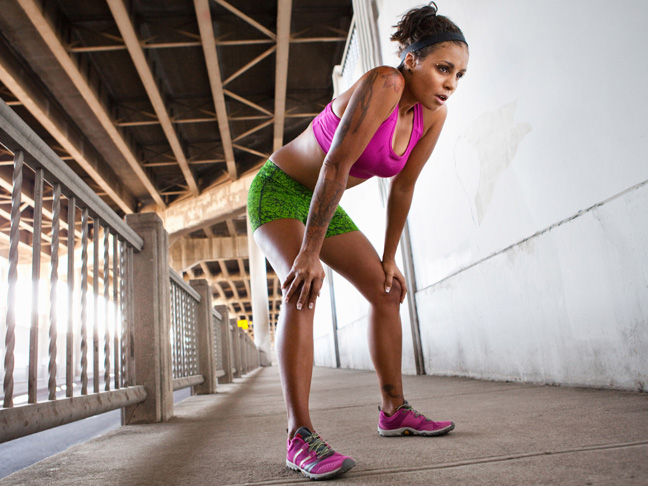First of all, what exactly is a side stitch? According to Richard Symister, physical therapist and owner of MovEvolution Physical Therapy in Brooklyn, New York, a side stitch is the diaphragm muscle fibers having a spasm. “The diaphragm, like the heart, is a muscle,” he explains. “If a muscle is overloaded, asked to do too much too soon or is ‘undertrained,’ that muscle will falter and fail or attempt to protect itself from damage.” So, if you jump into an activity before your body is ready, your diaphragm muscle fibers will do whatever it takes to contract your ribs and lumbar vertebrae in order to keep them protected. These spasms can last anywhere from a few seconds to several minutes and, unfortunately, be chronic.
Nobody wants to break his or her stride when a side stitch attacks, so it’s time to take action. Whether you’re a trained distance runner or hitting the track for the first time, we’ve got all the expert advice you’ll need — from immediate relief to long term preventative measures — in order to help you prevent side stitches.
1. Breathe deeply while exercising. Everything from poor posture to old injuries and weak abdominal muscles can affect the diaphragmatic dysfunction and breathing, says Symister. Breathing may sound easy, but it is important to make sure you’re doing it correctly, and that the diaphragm is dropping fully in order to get more oxygen into your system. If you’re in the middle of a workout and feel a side stitch coming on, try breathing deeply into the side stitch. “Breathing deeply into the side stitch can help it to go away,” says Jessica Bailey, a certified personal trainer and fitness instructor in New York City. To do this, slow down your workout (but don’t stop in your tracks), and exhale using the muscles of your diaphragm (really feeling your belly rise and fall). However, if you aren’t sure about the difference between chest and diaphragmatic breathing, or you need help with postural alignment and core stability, definitely see a physical therapist.
2. Stretch to beat the pain. When you feel a side stitch coming on, it may help to stretch out your diaphragm. In the case of a side stitch, your diaphragm is both working harder and getting less oxygen than it needs. You may find some relief by stretching your arms straight up over your head while bending at the waist in order to get any extra air out from below your diaphragm.
3. Warm up before you run. Never dive into a workout without warming up for at least two to three minutes. “When you go from a resting heart rate to a working heart rate you can create rapid-fire breathing and that can cause terrible side pain aka side stitches,” says Bailey. By preparing your body and gradually increasing your intensity, you should be able to prevent the side stitch. Symister also suggests joining a running club or working with a running trainer in order to train your diaphragm for your increased mileage, cadence, or level of intensity.
4. Increase our mobility. If you aren’t used to working out, or have scarring from a previous abdominal injury or surgery, Symister says your diaphragm may be having trouble getting more oxygen into your system. He suggests finding a seeking physical therapy in order to help free up restricted tissue.
5 Watch what you eat. Seems like a no brainer, but it’s important to watch what you eat before a workout. “Foods that are higher in fat and fiber take longer to digest,” says Bailey. Although these foods aren’t “bad,” if you eat them one to two hours before exercising you risk stomach upset and side stitches. Bailey recommends eating lightly before a workout — things like a fruit and nut bar, fresh veggie or fruit salad, or a high-protein energy bar (with around 200 calories). And always giving yourself plenty of time (30 to 60 minutes) to digest.
Now that you know exactly what a side stitch is and what to do about it (beforehand, in the moment, and long-term), get back to your workout and try not to let those pesky side stitches keep you from getting the exercise you want, need, and deserve.
More on Fitness:
- 11 Simple Home Workouts You Can Do During Your Kid’s Nap
- Celebrity-Created Fitness Wear Lines That We Love
- Quitting the Gym Was One of the Smartest Decisions I’ve Made
Photo: Getty
